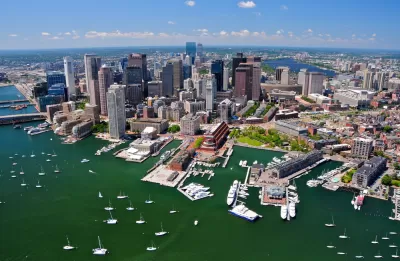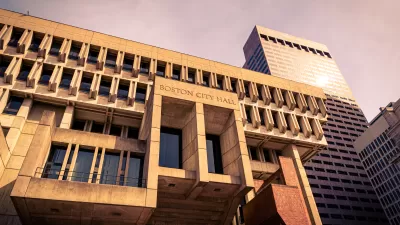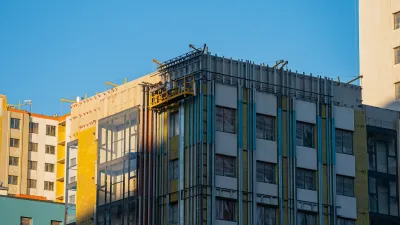As part of the city’s broader climate goals, Mayor Michelle Wu wants to require all new buildings to eliminate the use of fossil fuels.

After Massachusetts Governor Charlie Baker signed a climate bill last week, Boston Mayor Michelle Wu plans to introduce legislation that would eventually eliminate the use of fossil fuels in new construction in the city, where buildings make up roughly 70 percent of the city’s emissions.
As Maria Rachal reports in Smart Cities Dive, “The state law establishes a pilot program that will allow 10 municipalities to create local policies restricting the use of fossil fuels in new construction projects.” At present, Boston would be the 11th city to file a petition, but could be included in the program if other communities fail to meet the program’s requirements. “Those communities include Brookline, a town in the Boston suburbs that voted in 2019 to become the first East Coast town to ban fossil fuel hookups in new buildings but ultimately was not allowed by the state to do so.”
According to the source article, “Boston, a member of the national Building Performance Standards Coalition, last fall adopted a building performance standard that requires all buildings 20,000 square feet or larger to meet certain emissions targets by 2025, and have zero carbon emissions by 2050.” The city will engage in a public input process before determining the final parameters and timelines for making buildings fossil fuel-free.
FULL STORY: Boston aims to eliminate fossil fuels in new buildings

Alabama: Trump Terminates Settlements for Black Communities Harmed By Raw Sewage
Trump deemed the landmark civil rights agreement “illegal DEI and environmental justice policy.”

Planetizen Federal Action Tracker
A weekly monitor of how Trump’s orders and actions are impacting planners and planning in America.

Why Should We Subsidize Public Transportation?
Many public transit agencies face financial stress due to rising costs, declining fare revenue, and declining subsidies. Transit advocates must provide a strong business case for increasing public transit funding.

Understanding Road Diets
An explainer from Momentum highlights the advantages of reducing vehicle lanes in favor of more bike, transit, and pedestrian infrastructure.

New California Law Regulates Warehouse Pollution
A new law tightens building and emissions regulations for large distribution warehouses to mitigate air pollution and traffic in surrounding communities.

Phoenix Announces Opening Date for Light Rail Extension
The South Central extension will connect South Phoenix to downtown and other major hubs starting on June 7.
Urban Design for Planners 1: Software Tools
This six-course series explores essential urban design concepts using open source software and equips planners with the tools they need to participate fully in the urban design process.
Planning for Universal Design
Learn the tools for implementing Universal Design in planning regulations.
Caltrans
Smith Gee Studio
Institute for Housing and Urban Development Studies (IHS)
City of Grandview
Harvard GSD Executive Education
Toledo-Lucas County Plan Commissions
Salt Lake City
NYU Wagner Graduate School of Public Service





























